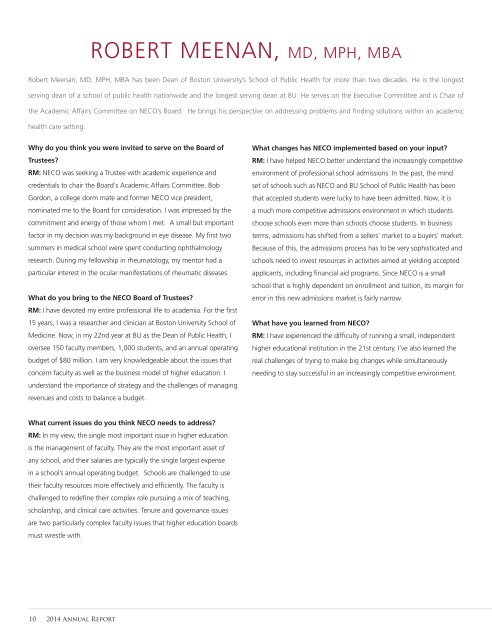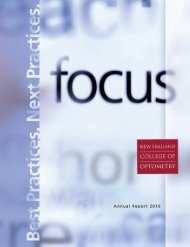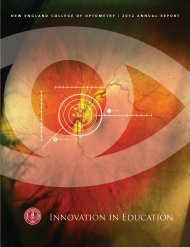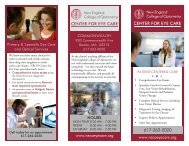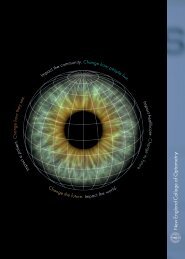2014 Annual Report
New England College of Optometry 2014 Annual Report
New England College of Optometry 2014 Annual Report
Create successful ePaper yourself
Turn your PDF publications into a flip-book with our unique Google optimized e-Paper software.
ROBERT MEENAN, MD, MPH, MBA<br />
Robert Meenan, MD, MPH, MBA has been Dean of Boston University’s School of Public Health for more than two decades. He is the longest<br />
serving dean of a school of public health nationwide and the longest serving dean at BU. He serves on the Executive Committee and is Chair of<br />
the Academic Affairs Committee on NECO’s Board. He brings his perspective on addressing problems and finding solutions within an academic<br />
health care setting.<br />
Why do you think you were invited to serve on the Board of<br />
Trustees?<br />
RM: NECO was seeking a Trustee with academic experience and<br />
credentials to chair the Board's Academic Affairs Committee. Bob<br />
Gordon, a college dorm mate and former NECO vice president,<br />
nominated me to the Board for consideration. I was impressed by the<br />
commitment and energy of those whom I met. A small but important<br />
factor in my decision was my background in eye disease. My first two<br />
summers in medical school were spent conducting ophthalmology<br />
research. During my fellowship in rheumatology, my mentor had a<br />
particular interest in the ocular manifestations of rheumatic diseases.<br />
What do you bring to the NECO Board of Trustees?<br />
RM: I have devoted my entire professional life to academia. For the first<br />
15 years, I was a researcher and clinician at Boston University School of<br />
Medicine. Now, in my 22nd year at BU as the Dean of Public Health, I<br />
oversee 150 faculty members, 1,000 students, and an annual operating<br />
budget of $80 million. I am very knowledgeable about the issues that<br />
concern faculty as well as the business model of higher education. I<br />
understand the importance of strategy and the challenges of managing<br />
revenues and costs to balance a budget.<br />
What changes has NECO implemented based on your input?<br />
RM: I have helped NECO better understand the increasingly competitive<br />
environment of professional school admissions. In the past, the mind<br />
set of schools such as NECO and BU School of Public Health has been<br />
that accepted students were lucky to have been admitted. Now, it is<br />
a much more competitive admissions environment in which students<br />
choose schools even more than schools choose students. In business<br />
terms, admissions has shifted from a sellers' market to a buyers' market.<br />
Because of this, the admissions process has to be very sophisticated and<br />
schools need to invest resources in activities aimed at yielding accepted<br />
applicants, including financial aid programs. Since NECO is a small<br />
school that is highly dependent on enrollment and tuition, its margin for<br />
error in this new admissions market is fairly narrow.<br />
What have you learned from NECO?<br />
RM: I have experienced the difficulty of running a small, independent<br />
higher educational institution in the 21st century. I’ve also learned the<br />
real challenges of trying to make big changes while simultaneously<br />
needing to stay successful in an increasingly competitive environment.<br />
What current issues do you think NECO needs to address?<br />
RM: In my view, the single most important issue in higher education<br />
is the management of faculty. They are the most important asset of<br />
any school, and their salaries are typically the single largest expense<br />
in a school’s annual operating budget. Schools are challenged to use<br />
their faculty resources more effectively and efficiently. The faculty is<br />
challenged to redefine their complex role pursuing a mix of teaching,<br />
scholarship, and clinical care activities. Tenure and governance issues<br />
are two particularly complex faculty issues that higher education boards<br />
must wrestle with.<br />
10 <strong>2014</strong> <strong>Annual</strong> <strong>Report</strong>


